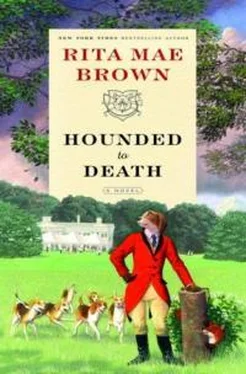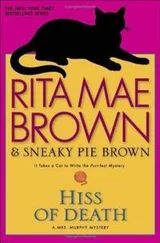Barry stared at Sister. “Your mind amazes me.”
“Just thinking out loud.” She brushed off what she hoped was a compliment.
“Honey, why would someone freeze Grant Fuller, then hang him up now?”
“I don’t know, Gray. And I find it peculiar that he was in a bag. If the killer wanted to scare the bejabbers out of people, you’d think he’d just hoist the body up there.” She stopped. “ ’Course, if he was already frozen and then moved, how would the killer get the meat hook through his back? Guess I answered my own question.”
Barry leaned against a tree, then wished he hadn’t, for ants marched up and down the trunk. “Bet you’re right about the meat hook.”
“Revenge. Grant’s death and Mo’s death are revenge killings,” Sister said.
“Could be.” Barry nodded.
“You knew Grant about as well as I did. Any thoughts?” Sister asked Gray.
“Affable. Glib, even.” Gray considered the person they’d met socially on occasion. “He didn’t strike me as a man to arouse passions one way or the other.”
Barry, listening, added, “He was getting a little roly-poly.” He smiled. “A surefire passion killer. Although there are other forms of passion. The only thing I heard—gossip, really—is that Grant showed such an interest in introducing Hope to the distillers that his wife nipped their association in the bud.”
“It was Grant who introduced her to bourbon.” Sister could picture it.
“Her fascination with distillers took over,” Barry continued. “She was a scientist—vets are—and distilling is a science. I could see why she’d become obsessed with it. A lot easier than subduing a thrashing horse to operate. The trick is getting close enough without getting kicked to stick the tranquilizer in.”
“You got that right.” Sister knew animals in pain could hurt you unwittingly. “Perhaps someone gave Grant a tranquilizer before doing whatever. Awful thing to be hoisted on a meat hook.”
“It’s grotesque.” Mitch wiped his brow and then his arms with an oversized handkerchief.
“If the point of the killing is revenge, why tranquilize the man? Letting him suffer would seem to me to be what the killer wanted.” Barry had hit the nail on the head.
“The things you do in this life catch up with you sooner or later.” Sister was aghast at the news but wanted to get back to work. She could be single-minded, especially when it involved hunting.
“Karma?” Barry smiled at her.
“More like bad luck, I’d say.” Mitch paid little heed to anything that couldn’t be quantified scientifically.
“Remember your Dante? The lowest circle in Hell has the Devil encased in ice.” Gray thought that was a haunting image of the paralysis of evil.
“Karma.” Sister repeated Barry’s judgment.
CHAPTER 20
“I’ll be glad when cubbing starts.” Sitting on the patio facing west, Gray leaned back against the big pillows in his comfortable wooden chair. Sister’s old house afforded a gorgeous view of the Blue Ridge Mountains.
Large bug lamps glowed as the sun set behind the mountains, the clouds above reflecting an undergirding of gold. It was Friday, August 22.
“Me, too.” Tootie agreed. Then suddenly her face registered dismay. “I forgot. I’ll be at Princeton.”
“Once you settle in up there, Sister will write you letters of introduction to the neighboring hunts. Most people don’t know it, but New Jersey has some good clubs. Always has.” Gray sipped a refreshing Tom Collins.
Not a heavy drinker, he did enjoy an end-of-the-day drink: gin or vodka mixes in summer and a scotch on the rocks in winter.
Sister carried out a large tray of fresh vegetables cut in thin strips, crackers, and some cheese—Raleigh, Rooster, and Golly following closely, in case she dropped something edible—and set the tray on the outdoor coffee table. She picked up her glass of tonic water with its big wedge of lime and dropped in a chair to the left of Gray.
He reached out his hand and she held it. “I was just telling Tootie that I’ll be glad when cubbing starts.”
Sister beamed, for she loved that he shared her passion for hunting, although perhaps not to her degree. “Sugar, I’m thrilled to hear that.”
He touched his military mustache with his right forefinger, smoothing it first right and then left, a slight grin twitching the carefully groomed mustache upward. “Always like seeing the young entry, and—well, once you’re hunting perhaps all this worry about the summer’s ugly events will fade away.”
“Been that bad, have I?” She squeezed his hand.
“I didn’t say that,” he replied diplomatically.
“Didn’t have to.” She turned to Tootie. “How bad have I been?”
Tootie stalled a minute, then said lightly, “Mildly obsessed.”
Sister leaned back, stretching her long legs onto the wooden footrest that matched the chair. “I know.”
“Here’s a rare moment.” Golly immediately jumped onto Sister’s lap.
“She admits things—sometimes.” Raleigh always defended his beloved human.
“I can count them on the claws of one paw.” Golly held out one razor-sharp claw to make her point, as well as to remind the lowly dogs that she could do serious damage.
“My master used to say, ‘Give Janie enough time and she’ll come round. Push her and you lose her, maybe forever. She doesn’t cotton to force.’ ” Rooster quoted his deceased master, Peter Wheeler, a former lover of Sister’s whom she still loved, really.
“Force? I’d like to see someone push her around. She might be old, but she’s quick as a cat. Well, almost.” Golly, in a revealing moment, praised Sister. It wouldn’t do for a cat to admit too much love for a human.
“I think Peter meant pressure more than physical force,” Raleigh commented soberly.
“You should be a lawyer.” With that Golly flopped on her side, closed her eyes, and pretended not to care a fig for the continuing conversation.
The three people had gone over Hope’s labels yet again—which Sister saw in the print shop—as well as the fact that Mo Schneider’s killer and Grant Fuller’s killer had never been found. They had moved on to the decayed foot that young Twist had retrieved.
“There are a lot of people up there”—Gray held his glass toward the Blue Ridge Mountains, color deepening to flaming scarlet in the clouds as the ridgeline itself turned cobalt blue—“who don’t come down. They live apart from what we euphemistically call civilization. They die in their cabins or out walking. They aren’t found except by vultures, feral dogs, and the like. I expect the foot comes from such a source.”
“I thought the people who lived up there had been run off.” Tootie couldn’t believe how vivid the sunset was, the colors changing every minute.
“You mean during the Depression when the federal government bought up land and built the Skyline Drive?” The stirring of twilight breezes started up, and the first bat darted overhead as Sister spoke.
“Right. Wasn’t it a terrible thing? Whole families torn off the land?” The beautiful girl liked reading history.
“Was.” Gray had heard about it from his parents, aunts and uncles who thankfully lived at the old Lorillard home place and suffered no ill effects from the upheaval. “And some folks died shooting, too. Not all the stories made the history books. In fact, most of them didn’t. We digest a pabulum version of our history. By design, of course.”
“Cynical but true.” Sister nodded.
“However, some people who were forced off their land crept to some other place below the federal lands and made do. In the sixties, people came from other parts and vanished into the ravines and hollows. It’s one of the odd things about our country: We don’t study the thousands—maybe millions—of people who choose not to participate in the Great American Way.” Gray heard a high-pitched bat squeak.
Читать дальше












